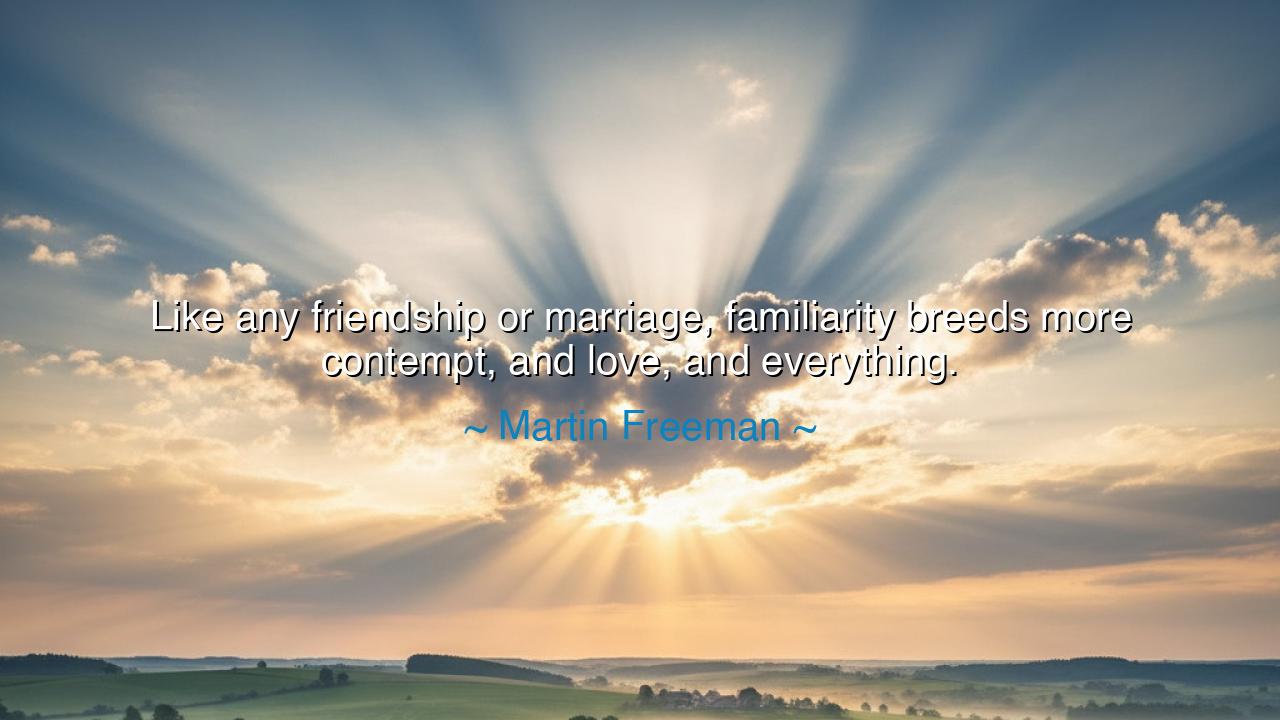
Like any friendship or marriage, familiarity breeds more
Like any friendship or marriage, familiarity breeds more contempt, and love, and everything.






In the reflective and candid words of Martin Freeman, the actor and philosopher of the human heart, there is hidden a truth as ancient as love itself: “Like any friendship or marriage, familiarity breeds more contempt, and love, and everything.” This simple yet profound saying captures the paradox of human closeness — that the more deeply we know another soul, the more power we grant them to move us, to delight us, to wound us. Freeman’s words reveal the double-edged nature of familiarity: it deepens both love and friction, it exposes both the beauty and the frailty of human bonds. In his reflection, we are reminded that intimacy is not a gentle garden, but a wild field where flowers and thorns grow together.
The origin of this truth lies in the heart of Freeman’s own observations — not merely as an artist portraying complex relationships on screen, but as a man who has lived within the tides of closeness and distance, laughter and weariness. His words echo an old proverb, “Familiarity breeds contempt,” yet he gives it new life and balance by adding, “and love, and everything.” In doing so, he does not reject the wisdom of the ancients, but refines it. He reminds us that familiarity does not only reveal what is tiresome or flawed in others; it also reveals what is tender, enduring, and true. When we walk long enough beside another — whether friend or spouse — we see their imperfections, but also their humanity. The heart that remains open in such closeness learns to love not despite the flaws, but through them.
For love and contempt are not opposites; they are twins born of intimacy. Only those we know deeply can disappoint us deeply, and only those who have seen our weakest moments can understand us completely. To dwell in intimacy is to dwell in truth — the shining and the shadow alike. And yet, this is the essence of what it means to share a life. To know another person truly is to hold both their grace and their failure in your heart, and still choose to stay. Freeman’s wisdom lies in this acknowledgment: that “everything” — the laughter, the irritation, the awe, the sorrow — all coexist in the realm of the familiar. Such is the human condition, full of contradiction and beauty intertwined.
History offers us many portraits of this eternal truth. Consider the marriage of Abigail and John Adams, two souls bound not only by affection but by intellect, loyalty, and long separation. Their letters, filled with passion and disagreement alike, show how familiarity sharpened both their devotion and their conflict. John’s stubbornness clashed with Abigail’s independence; their debates could have driven them apart. Yet their love endured because it was forged in honesty. They did not flee from their differences — they embraced them, knowing that even contempt born of closeness could be redeemed through understanding. Their union reminds us that real love is not the absence of frustration, but the perseverance of affection through it.
The ancients understood this as well. The philosopher Aristotle taught that true friendship arises only when two people know one another so well that their souls reflect one another. Such intimacy is not peaceful in all moments; it is a crucible that refines both hearts. In this way, Freeman’s words echo a timeless idea: that the deepest bonds are not calm harbors, but turbulent seas that teach us to navigate with compassion. To share your life with another is to agree, silently, to be changed by them — to let their habits, their moods, and their truths rub against your own until the rough edges of both souls are worn smooth.
But there is a quiet grace in this friction. For as familiarity reveals more of another’s flaws, it also deepens our empathy. When we live closely with someone — whether in marriage, friendship, or family — we learn patience, forgiveness, and humility. We see that others, like ourselves, are imperfect pilgrims seeking meaning. The contempt that arises is not an enemy of love; it is a test of it. It is the crucible through which affection must pass if it is to become enduring. If we can look upon the familiar face — weary, flawed, human — and still feel tenderness, then our love has ripened into wisdom.
Therefore, my child, take this teaching to heart: do not fear the weariness that sometimes comes with closeness. Do not mistake moments of frustration or boredom for the death of love. These are but the signs that you have stepped beyond illusion into truth. The friendship or marriage that lasts is not the one free of conflict, but the one that holds steady through it. Cherish both the laughter and the silence; honor both affection and irritation as parts of the same sacred dance.
For as Martin Freeman reminds us, familiarity breeds not only contempt, but also love, and everything in between — the full range of what it means to be human. To live in closeness is to live fully, to accept that joy and disappointment walk hand in hand. When you understand this, you will no longer seek perfection in others, but depth; not comfort, but truth. And in that truth, you will find the richest kind of companionship — one that, though imperfect, endures, and in enduring, becomes divine.






AAdministratorAdministrator
Welcome, honored guests. Please leave a comment, we will respond soon